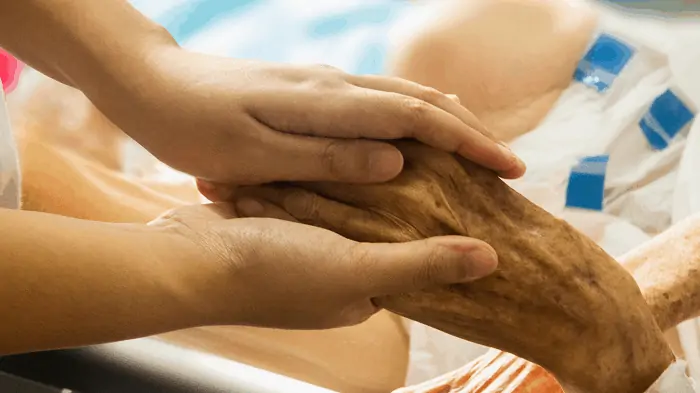With Valentine’s Day coming up, and eleven months into the pandemic, I’ve been thinking about the importance of relationships.
When I was 15, I got my first paid job — at a nursing home. I wasn’t old enough to be a nurse’s aide, though as I got older, I took on more and more responsibility, helping our residents walk, eat, get dressed, bathe.
And I developed relationships with the people in our care.
James had a glass eye that he would leave in a cup next to his bed at night. We would talk, read, and play games; I adored his offbeat sense of humor and kindness. James once showed me a gold necklace in the shape of a cross, inlaid with red and blue stones. Rubies? Sapphires? Whatever they were, the piece’s sentimental value was clear.
Then he said he wanted me to have the necklace, as thanks for my friendship.
It broke my heart to say I couldn’t accept it, but we were prohibited from taking gifts from patients. James got upset and spoke to management, but they didn’t budge.
I eventually had to leave my job at the nursing home, because it became too heartbreaking to lose people I cared about.

As humans, we all crave energetic connections, whether romantic or platonic. And money, which is just another form of energy, affects relationships in interesting ways.
For some clients, money disputes create sticky relationship problems, particularly in couples where one is a spender and one is a saver. It’s not uncommon to see fingers pointed: “She’s overly frugal!” “He’s spending too much!”
Inserting someone like me into that mix takes the emotional heft out of money disagreements. Previously fraught conversations about spending soon become practical, rote, and eventually, even joyful.
My clients, a husband and wife, wanted to take out a loan to buy stationary bikes, which cost $1,500.
“You just got out of debt,” I told them. “From now on, we aren’t incurring any more debt. It’s not happening.”
The husband started laughing: “I told you she was going to say that.”
“Yeah, I know,” his wife said.
But after that shared laugh, a curious thing happened. Understanding that debt was off the table, the two of them got creative. One remembered a large amount of cash they had saved in one of their spending silos. The other pointed out they were soon due a refund. To their amazement, and because of their rigorous adherence to the plans we’d set out together, they were able to come up with the $3000 for their bikes without needing to go into debt or deplete their savings.
I’ve had clients tell me our work has saved their relationship, and for me, it’s gratifying to witness how clients’ changed relationship with money can inspire other types of change.
A freedom from attachment — to either the albatross of debt or monetary disagreements — allows everyone to focus on what’s truly important in life.
After my elderly patient James passed on, his two sisters called me in to say thanks for being a part of his life. And in a scene straight out of a movie, they pulled out the gold necklace once more. James had told them he wanted me to have it after his death. They wouldn’t hear no.
I was and am grateful to have the necklace: a beautiful token of James’s friendship, a reminder of a bond formed. To this day, seeing it reminds me of the real value in things: the money and energy they represent, the space they carve in our hearts, the soulful reminders of who we are at core.
